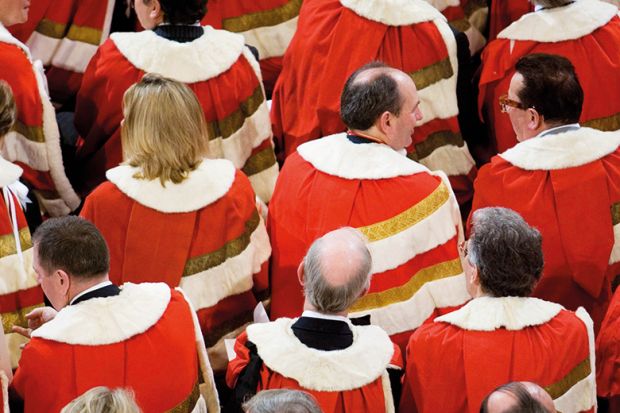The UK government’s Higher Education and Research Bill is likely to face strong opposition in the House of Lords, despite amendments intended to address concerns.
Amendments tabled on 14 November have been described by the government as a response to concerns, particularly on the absence of student representation on the board of the new sector regulator and on threats to university autonomy from its powers.
The bill creates a powerful new Office for Students as chief regulator of the sector in England, as well as a new UK Research and Innovation organisation. The move would create a split between the oversight of teaching and research, currently combined within the funding councils for the UK nations.
The government’s amendments mean that the OfS board will now include a member who has “experience of representing or promoting the interests of individual students, or students generally”. The National Union of Students had called for student representation.
Universities had also objected that the bill could give the secretary of state powers over the sector at course level. One amendment states that guidance from the secretary of state on “a particular course of study must not guide the OfS to perform a function in a way which prohibits or requires the provision of a particular course of study”.
But critics have questioned whether the amendments offer significant change. The amendments do not address concerns about the bill’s plans to open up the sector further to private and for-profit providers by making it easier for new institutions to gain degree awarding powers and university title.
The amendments also leave in place OfS powers to strip providers of degree powers and university title even when granted by Royal Charter, which is the case for older universities.
The bill will have to gain the backing of the House of Lords – where the government does not have a majority – in order to become law.
Lord Rees, an influential peer and a former president of the Royal Society, told Times Higher Education: “I know that strong concerns remain about the OfS and its powers to accredit and de-accredit courses and institutions.”
He added: “I'm one of those peers who thinks that the proposal to set up UKRI is an unnecessary upheaval, and will concentrate power in the hands of one ‘supremo’ who has the over-demanding remit of notably being adviser on science policy but also being the line manager and accounting officer for nine disparate and complex organisations.”
Nick Hillman, director of the Higher Education Policy Institute, said the amendments were “sensible” but added: “I don’t think they are going to particularly reduce the pressures in the House of Lords for them [the government] to make further amendments…I still think the bill could have quite a difficult time in the House of Lords.”
Mr Hillman said the government chose “an interesting form of words” in its amendment on student representation on the OfS board, suggesting it may not meet the expectations of some.
He noted that the Browne Review, set up in 2009 to review fees, had “ticked the box of student/young person representation” in the minds of ministers by including a recent graduate on the panel, but “I don’t think you would have found many people in the NUS who would have agreed" that amounted to authentic representation of the student voice.
Register to continue
Why register?
- Registration is free and only takes a moment
- Once registered, you can read 3 articles a month
- Sign up for our newsletter
Subscribe
Or subscribe for unlimited access to:
- Unlimited access to news, views, insights & reviews
- Digital editions
- Digital access to THE’s university and college rankings analysis
Already registered or a current subscriber?




